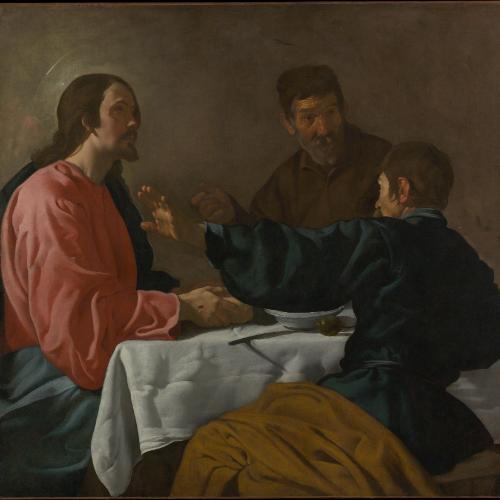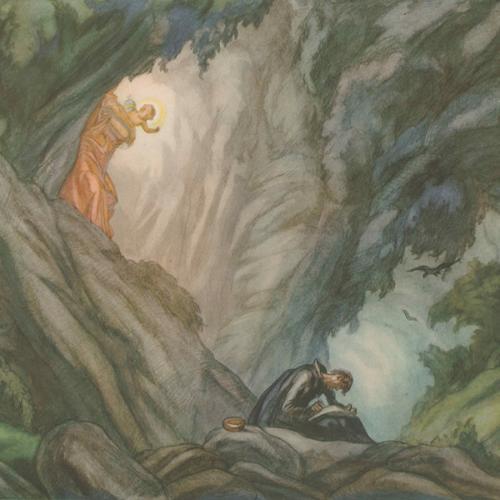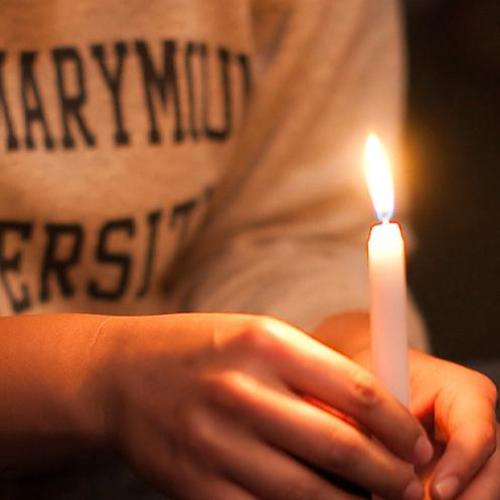
Plaque with Scenes at Emmaus (Carolingian, ca. 850-900)
On the Road: Reflections on the Encounter at Emmaus
Fr. Eddie Siebert, SJ
-
That very day, the first day of the week, two of Jesus’ disciples were going to a village seven miles from Jerusalem called Emmaus, and they were conversing about all the things that had occurred. And it happened that while they were conversing and debating, Jesus himself drew near and walked with them, but their eyes were prevented from recognizing him.
He asked them, “What are you discussing as you walk along?”
They stopped, looking downcast. One of them, named Cleopas, said to him in reply, “Are you the only visitor to Jerusalem who does not know of the things that have taken place there in these days?”
And he replied to them, “What sort of things?”
They said to him, “The things that happened to Jesus the Nazarene, who was a prophet mighty in deed and word before God and all the people, how our chief priests and rulers both handed him over to a sentence of death and crucified him. But we were hoping that he would be the one to redeem Israel; and besides all this, it is now the third day since this took place. Some women from our group, however, have astounded us: they were at the tomb early in the morning and did not find his body; they came back and reported that they had indeed seen a vision of angels who announced that he was alive. Then some of those with us went to the tomb and found things just as the women had described, but him they did not see.”
And he said to them, “Oh, how foolish you are! How slow of heart to believe all that the prophets spoke! Was it not necessary that the Christ should suffer these things and enter into his glory?” Then beginning with Moses and all the prophets, he interpreted to them what referred to him in all the Scriptures.
As they approached the village to which they were going, he gave the impression that he was going on farther. But they urged him, “Stay with us, for it is nearly evening and the day is almost over.” So he went in to stay with them.
And it happened that, while he was with them at table, he took bread, said the blessing, broke it, and gave it to them. With that their eyes were opened and they recognized him, but he vanished from their sight.
Then they said to each other, “Were not our hearts burning within us while he spoke to us on the way and opened the Scriptures to us?” So they set out at once and returned to Jerusalem where they found gathered together the eleven and those with them who were saying, “The Lord has truly been raised and has appeared to Simon!”
Then the two recounted what had taken place on the way and how he was made known to them in the breaking of bread.
I love today’s Gospel reading. I teach in the School of Film and Television so you might think it’s because of its obvious cinematic qualities. It has all the ingredients of a great movie: a buddy road trip, character arcs Joseph Campbell would love, and in such a short space, ample plot twists. (I mean, not only does Jesus show up incognito at the beginning of the Gospel but he vanishes at the end!) All that aside, the main reason I love this Gospel is because, despite it being written 2,000 years ago, it’s not a story that’s over and done with. Not at all. I love this Gospel because it’s our story today...yours and mine, at this very moment.
When we meet the two disciples on the road to Emmaus, they’re feeling emotions of confusion and despair we know well. The world, as they knew it, was turned completely upside down when Jesus was crucified. It left them lost, heartbroken, and full of regret.
These two had been following Jesus and had certain expectations for what having faith in Him meant. They were hoping for a political messiah--they thought Jesus had come to succeed David and set Israel free. But that’s not who Jesus was. They had expectations for how God was going to operate in their life. But it didn’t go that way. All that excitement, all that hope, all that faith, came to an end when Jesus was executed. The disciples were left feeling unsure, abandoned, and fearful of the unknowns...unable to comprehend what their “new normal” might be.
I think we can all relate to their despair. We’ve all experienced similar emotions over the past month. Throughout the world, the things that were familiar, expected, hoped for, are being re-defined at this very moment. I’m preaching alone in my room to Zoom! Across the globe, people are struggling with their health, finances, and well-being. Here at LMU, when you look around campus, you can feel the physical absence of our community...a community whose example of love and connection is usually so visible throughout this campus. It’s easy to feel mournful. It’s easy to struggle to find God in all of this.

But in the midst of the separation, isolation, and fear so many are feeling throughout the world, today’s Gospel gives us some much-needed hope. Here’s the Good News for those disciples and the Good News for us: no matter how dark things get, there are hidden gifts even in the greatest heartaches. New life comes after loss, light defeats darkness and grace abounds, often in the most unexpected way.
For these disciples, it was in the form of a stranger joining them on the road. Everything changes for them the moment they’re joined by this stranger who is Jesus. But they don’t recognize him. You may wonder why He doesn’t just spell it out to them immediately. It might have gotten His message across faster, after all. But as we see throughout the Gospels, God tends to prefer appearing in everyday, ordinary ways. In other words, God often shows up in ways you and I can easily miss.
Frederick Buechner, Presbyterian minister and novelist, wrote, "The sacred moments, the moments of miracle, are often the everyday moments, the moments which, if we do not look with more than our eyes or listen with more than our ears reveal only a gardener, a stranger coming down the road behind us, a meal like any other meal. But if we look with our hearts, if we listen with all our being and imagination . . . what we may see is Jesus himself." (The Magnificent Defeat, p.87-88)
If you and I listen with all our being and imagination, where do we see Jesus in our own struggle today? Have our eyes, ears, and hearts really been open to Him?
It’s interesting what Jesus does when he first encounters the disciples. He could have transformed water into wine, walked on water, or something else equally grand. Instead, Jesus does something that is perhaps more extraordinary: he listens to them. The disciples tell them what’s on their minds and he really, really listens. And as they tell him, their isolation begins to break down. He doesn’t judge or minimize their pain. Instead he gives them the great gift of empathy, a gift he offers you and me today.
Then he connects their story to the greater stories from the Jewish tradition. He reminds them that they’re connected, part of something larger than themselves...that they’re not alone. Maybe we’ve felt that sense of connection with our families, in our student orgs and teams, on retreats. That feeling of hope and unity is more easily felt through experiences like that. But when we’re isolated, we can forget. Jesus helps the disciples to remember...before they even realize they’re talking with Jesus. In our current isolation, how do you and I remember? Do we sense God’s love giving us new life in unexpected ways? How are we being transformed? Even at this very moment?
When the disciples get to Emmaus, still not aware that the stranger beside them is Jesus, they invite Him in to share a meal with them. He doesn’t force them to invite him in. In fact, he was ready to keep moving. But it’s the disciples who ask Him to stay with them.
I think this tells us that though we may not recognize Jesus, He always recognizes us. But we have to invite Him in. That’s how He stops being a stranger.
Sometimes we don’t feel ready for that. Like we’re not on the right road. But it’s not about being on the right road. We can invite God in on whatever road we find ourselves. And when we do, things change.
When the disciples trust Jesus enough to invite him into their home, the roles reverse. The guest becomes the host. After they invite him in, He invites them into His inner space through the blessing and breaking of bread together. Suddenly they recognize him....and then...He disappears. But instead of returning to their previous feelings of grief, things have forever changed for the disciples. Even in His absence, they now know they’re in deep communion with Jesus, with each other.
They look back on their previous conversation with Him and ask, “Did our hearts not burn when he talked to us?” They see it in a new light. They’re energized, ready to set the world on fire. They pick up and head to back to Jerusalem, a city that would be quite dangerous for them. But they’re ready for whatever the new normal may be because they know they’re not alone, even if Jesus is no longer physically with them. They have a new vision of life--one where hope has returned and they realize death no longer has the final word.
It’s our choice: we can continue on the road to Emmaus full of despair or we can invite Jesus into our healing and start to feel hope again. He will never force the invitation, but he’ll also never turn it down. Even if we don’t recognize him, He recognizes us. And if we recognize him back, we, like the two disciples, will be forever changed. When the resurrected Christ opens our eyes, ears, and hearts, we’re able to see the hidden gifts in all of this, the community that no social distance can destroy, and the light that no amount of darkness can ever extinguish.
This homily was originally delivered on Sunday, April 26 at the LMU Campus Ministry weekly online prayer service. To participate in upcoming Sunday prayer services, visit the Campus Ministry website.
Questions for Reflection
- When have I been transformed by an encounter in unexpected ways? How was God present in that experience?
- How do I listen as Jesus does in this story? In what ways do I invite in the stranger as the disciples do?
- How are my eyes, ears, and heart open to recognize God in unexpected places?

